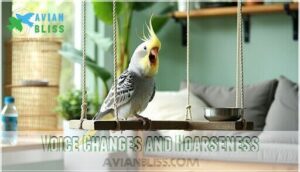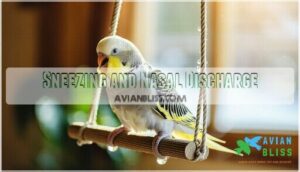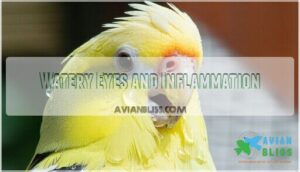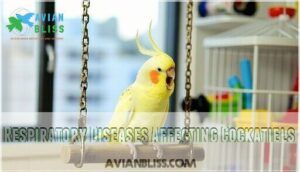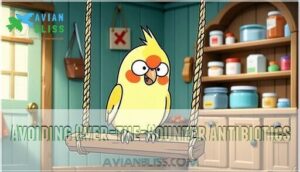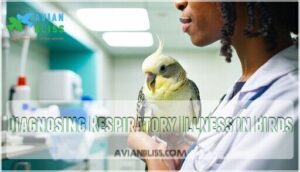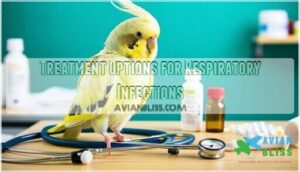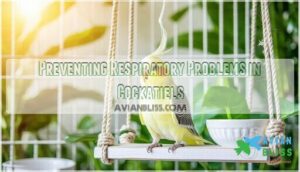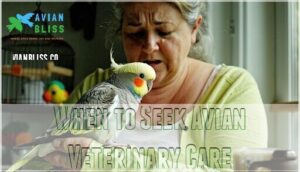This site is supported by our readers. We may earn a commission, at no cost to you, if you purchase through links.

Watch for extra signs like labored breathing, watery eyes, or a raspy voice. Skip DIY fixes and instead give your cockatiel a warm, clean space, and reach out to an avian vet without delay.
Sometimes, what starts as a little cough can snowball, so treating the cause early keeps those happy chirps coming. Stick around for key prevention tips up next.
Table Of Contents
- Key Takeaways
- Why is My Cockatiel Coughing?
- Signs of Respiratory Issues in Cockatiels
- Common Causes of Cockatiel Coughing
- Respiratory Diseases Affecting Cockatiels
- How to Care for a Coughing Cockatiel
- Diagnosing Respiratory Illness in Birds
- Treatment Options for Respiratory Infections
- Preventing Respiratory Problems in Cockatiels
- When to Seek Avian Veterinary Care
- Frequently Asked Questions (FAQs)
- What should I do if my bird is coughing?
- What are signs of illness in cockatiels?
- How do you treat a respiratory infection in a cockatiel?
- Why does my cockatiel keep gagging?
- Can I catch respiratory infections from my coughing cockatiel?
- How often should I clean my cockatiels cage to prevent coughing?
- Can I use human cough medicine for my cockatiels cough?
- Will a humidifier help relieve my cockatiels coughing symptoms?
- Can cockatiels develop allergies that cause coughing and sneezing?
- Can cockatiel coughing affect other birds in the home?
- Conclusion
Key Takeaways
- Spotting coughing, raspy voices, or watery eyes means your cockatiel could be sick, so always pay attention to these signs. – Don’t ignore a cough—reach out to an avian vet right away, since respiratory infections worsen fast in birds. – Keep your bird’s space clean, smoke-free, and humidified between 40–60% to help prevent health issues. – Feed your cockatiel a diet rich in vitamin A by offering fresh veggies and high-quality pellets to strengthen immunity.
Why is My Cockatiel Coughing?
If you hear your cockatiel cough, it can be worrying, but a quick check for other symptoms helps you spot problems early.
Sometimes it’s just a bit of dust, but ongoing coughing could mean your bird needs a vet—no bird ever coughs just to get out of chores!
Normal Vs. Abnormal Coughing
If your cockatiel gives a quick cough, especially after preening, it’s usually normal.
But watch for frequent coughing, odd sound differences, changes in posture, low activity levels, or feather ruffling. These can signal respiratory infections.
When in doubt, trust your instinct and call a veterinarian. Diligent observation can make all the difference in your cockatiel’s health.
Common Causes of Coughing
Sometimes that odd little cough signals more than just dust. Coughing in birds can come from several causes:
- Infection sources like respiratory infections lead to trouble.
- Sinus irritants, such as smoke, stir up problems.
- Vitamin deficiency—lacking Vitamin A—can trigger issues.
- Environmental factors, like air dryness, upset sensitive lungs.
Catching these signs early gives you a real shot at getting your bird’s breathing back on track.
When to Worry
Your feathered friend’s cough severity, appetite loss, or new bouts of lethargy can signal real bird health concerns. If coughing comes with emergency symptoms like open-mouth breathing or dramatic behavioral changes, act fast.
Here’s a quick table to help spot trouble:
| Symptom | What to Watch | When to Call a Vet |
|---|---|---|
| Appetite Loss | Not eating | Persistent or worsening |
| Lethargy Signs | Less playful | Lasting more than a day |
| Cough Severity | Labored breath | Immediate concern, call |
Signs of Respiratory Issues in Cockatiels
If your cockatiel starts sneezing, breathing with its mouth open, or sounds hoarse, it may have a respiratory problem, but don’t panic—these symptoms just mean your bird needs attention.
Watch for changes like watery eyes or nasal discharge, and if you spot them, it’s time to call the avian vet before your little friend tries to sneeze on your breakfast.
Voice Changes and Hoarseness
A raspy or croaky voice in your bird can signal trouble. Watch for:
- Vocal cord swelling leading to wheezy chirps.
- Syrinx inflammation changing sound production.
- Tracheal obstruction or laryngeal paralysis affecting vocal clarity.
- Consistent changes in voice.
If these signs stick around, it’s time to talk to an avian vet—don’t let cockatiel health take a backseat.
Open-Mouth Breathing
If you spot your bird breathing through its open beak—almost like it’s panting after a marathon—pay attention. Open-mouth breathing isn’t just a quirky habit. It can signal airway obstruction, heatstroke, or exercise intolerance.
Sometimes, rapid breathing links to respiratory infections, stress indicators, or even bird diseases. If coughing or labored breaths continue, call your avian vet.
Sneezing and Nasal Discharge
Noticing your cockatiel sneezing or wiping its beak? Keep an eye out for these common red flags:
- Clear vs. colored nasal discharge types signal different respiratory infections.
- Sneezing frequency that increases may hint at sinus inflammation from feather dust.
- Secondary infections can sneak in fast, so seek an avian veterinarian if symptoms linger—especially for stubborn Cockatiel health problems.
Watery Eyes and Inflammation
In the midst of daily routines, your cockatiel’s watery eyes and inflammation might seem subtle, but don’t shrug them off. Conjunctivitis signs, sinus swelling, or blocked tear duct often point to irritation from eye irritants, secondary infections, or vitamin A deficiency. Always check for respiratory infections or nasal discharge. Call your vet if respiratory disease symptoms persist.
| Symptom | Possible Cause | Take Action |
|---|---|---|
| Watery eyes | Eye irritants | Clean cage, vet check |
| Sinus swelling | Respiratory disease | Increase humidity |
| Swollen/Red eyelids | Vitamin A deficiency | Adjust diet, seek help |
Common Causes of Cockatiel Coughing
You’re probably wondering what’s behind your cockatiel’s cough, and it’s not always as simple as a little feather stuck the wrong way.
Certain health issues, from respiratory infections to smoke exposure, may call for a closer look and sometimes even a trip to the vet if Polly’s wheezing becomes more than just a sneeze.
Upper Respiratory Tract Infections
If you notice your cockatiel showing nasal discharge or labored breathing, upper respiratory tract infections might be to blame. These infections often start with tiny irritants, like aerosol sprays or poor humidity, messing with their unique sinus anatomy.
Infection sources can include contaminated feed. A common cause can be vitamin A deficiency due to all-seed diets.
Antibiotics made for birds can make a big difference—so if you notice any issues, don’t hesitate to get your cockatiel checked out by a vet right away.
Hypovitaminosis A
A lack of Vitamin A—also called hypovitaminosis A—can sneak up on your cockatiel faster than you can say “carrot.” Low levels cause sinus pathology and epithelial damage, leaving your bird open to coughing, immune deficiency, and infections.
Make dietary changes before small issues become big cockatiel health problems:
- Bright veggies
- Leafy greens
- Pelleted bird food
- Vitamin A supplements
Ammonia Toxicosis
If your cockatiel’s cage smells sharp, a Source of Ammonia like dirty litter can raise Toxicity Levels indoors. Ammonia Toxicosis irritates the airways, damaging kidneys and raising the risk of respiratory infections in birds.
Check your ventilation systems often, and focus on Litter Management to avoid environmental toxins—a little cleaning saves a lot of squawks.
Humidity Extremes
Both extremes spell trouble for your cockatiel’s respiratory health. Dry air causes irritated sinuses and weakened defenses against respiratory infections, while humid air creates perfect conditions for mold growth. Ideal humidity sits between 40-60%.
Good airflow is vital—without it, humid, stale air lets bacteria and fungi thrive. Swings in humidity like this directly set your bird up for respiratory trouble.
Cigarette Smoke Exposure
Secondhand smoke poses serious risks to your cockatiel’s delicate respiratory system. Nicotine poisoning and lung damage can occur quickly from cigarette exposure, while feather contamination spreads toxins throughout your bird’s body.
Environmental irritants like smoke trigger coughing and respiratory disease. Proper ventilation importance can’t be overstated—keep smoking areas completely separate from your bird’s living space to prevent these dangerous environmental factors affecting birds.
Respiratory Diseases Affecting Cockatiels
Your cockatiel’s cough might signal serious respiratory diseases that need quick attention from an avian vet.
These conditions include bacterial infections like mycoplasma and chlamydia, fungal problems such as aspergillus, parasitic infections from air sac mites, and damage from environmental toxins.
Bacterial Infections (Mycoplasma, Chlamydia)
Bacterial culprits behind your cockatiel’s cough pack a serious punch. Mycoplasma and Chlamydia psittaci cause respiratory infections that demand immediate attention from an avian vet.
- Mycoplasma symptoms include sinusitis, swollen eyelids, and nasal discharge
- Chlamydia transmission occurs through respiratory secretions and contaminated surfaces
- Antibiotic resistance makes proper diagnosis essential before treatment
- Zoonotic potential means these infections can spread to humans
Doxycycline treats chlamydiosis effectively when caught early. This treatment is important because psittacosis affects many species.
Keeping things extra clean and making sure your cockatiel gets a healthy diet go a long way toward stopping these bacteria in their tracks.
Fungal Infections (Aspergillus)
Aspergillosis strikes cockatiels when fungal spores overwhelm their immune systems, creating a stubborn respiratory infection that’s trickier to diagnose than bacterial infections.
Your bird shows tail bobbing, difficulty breathing, and voice changes, but chronic aspergillosis develops slowly over months.
Treatment duration extends for weeks or months using antifungal medications, and diagnosis challenges often delay proper care.
Parasitic Infections (Air Sac Mites)
Air sac mites are microscopic parasites that invade your cockatiel’s respiratory system, causing persistent coughing and breathing difficulties. These tiny invaders complete their mite life cycle within your bird’s air sacs, spreading through transmission routes like contaminated food and close contact with infected pet birds.
- Microscopic parasites living in air sacs
- Cause persistent coughing and wheezing
- Spread through contaminated surfaces and birds
- Require ivermectin treatment from veterinarian
- Preventative care includes quarantining new birds
Environmental Toxins
Beyond secondhand smoke, household chemicals pose serious threats to your cockatiel’s delicate respiratory system. Air fresheners, cleaning products, and aerosol exposure can trigger coughing fits and breathing problems. Even dust control sprays contain compounds that irritate their sensitive air sacs, leading to respiratory issues that mimic infections.
| Environmental Toxin | Health Impact |
|---|---|
| Aerosol sprays | Immediate respiratory irritation |
| Cleaning products | Chemical burns in airways |
| Air fresheners | Toxic fume inhalation |
| Paint fumes | Lung tissue damage |
| Perfumes/colognes | Allergic respiratory reactions |
How to Care for a Coughing Cockatiel
When your cockatiel starts coughing, you’ll need to provide supportive care while preparing for a vet visit.
Create a warm, humid environment and make it easy to access food and water, but avoid giving any medications without professional guidance.
Heating The Environment
When your cockatiel shows respiratory issues, maintaining consistent temperatures becomes your first line of defense. Create a warm, humid environment using safe heaters or heating pads, but avoid drafts that can worsen breathing problems.
Supplemental heat helps stressed birds recover faster, while humidity control prevents environmental irritants from aggravating respiratory infections.
Food and Water Accessibility
When your cockatiel’s fighting respiratory issues, easy access to fresh water and food becomes paramount. Place multiple feeding stations at different heights so your bird doesn’t strain while breathing.
Clean bowls daily to prevent bacterial growth. Consider elevated food placement and foraging toy options to encourage natural eating behaviors while supporting recovery from hypovitaminosis A.
Vitamin and Calcium Supplementation
Supporting your coughing cockatiel with proper vitamin and calcium supplementation can aid recovery. Vitamin A deficiency often contributes to respiratory issues, so consider quality supplements.
However, supplement overdosing poses risks—follow dosing guidelines carefully. Focus on natural calcium sources like cuttlebone. Monitor supplement timing with meals for better vitamin absorption, and watch for deficiency symptoms.
Avoiding Over-the-Counter Antibiotics
Human medicine cabinets aren’t bird-friendly solutions. Over-the-counter antibiotics can worsen antibiotic resistance and disrupt your cockatiel’s delicate avian microbiome. Misdiagnosis dangers multiply when you skip professional vet consultation.
Getting the right diagnosis and treatment is key when birds have respiratory infections. While things like a healthy diet can support recovery, the best move is to reach out to an avian vet anytime your cockatiel seems unwell.
Diagnosing Respiratory Illness in Birds
When your cockatiel shows signs of respiratory illness, your vet will need to run specific tests to find the exact cause.
They’ll perform a physical exam, blood work, and may take chest X-rays or collect samples from your bird’s sinuses to identify whether bacteria, fungi, or parasites are causing the problem.
Physical Examination and Blood Tests
Thorough examination starts the diagnostic process when your cockatiel shows respiratory distress. Your veterinarian will use auscultation findings to listen to breathing patterns and heart sounds through a stethoscope. Palpation techniques help detect swelling or masses around the throat and chest area.
Blood collection allows for detailed hematology results and biochemistry analysis, revealing infection markers, vitamin deficiencies, and organ function.
By using these diagnostic methods, your vet can choose the right treatment plan and give advice tailored to your bird’s needs, making sure their health is carefully evaluated before moving forward.
Radiographs and Sinus Aspirate
When diagnosing respiratory disease in cockatiels, your vet may recommend radiographs and sinus aspirate procedures for deeper investigation. Radiograph interpretation reveals air sac inflammation and structural changes, while sinus aspirate technique involves collecting samples directly from affected sinuses. Though anesthesia risks exist, these procedures offer greater diagnostic accuracy compared to basic exams alone.
- X-ray images show air sac thickening and respiratory tract abnormalities
- Sinus aspirate provides direct samples for bacterial, fungal, or parasitic analysis
- Sample analysis identifies specific pathogens causing your bird’s respiratory symptoms
- Combined results guide targeted treatment plans for faster avian health recovery
Treatment Options for Respiratory Infections
When your vet diagnoses a respiratory infection in your cockatiel, they’ll prescribe targeted treatments based on what’s causing the problem.
You might need antibiotics for bacterial infections, antifungal medications for yeast problems, or antiparasitic drugs if mites are the culprit.
Antibiotics for Bacterial Infections
After your vet confirms bacterial respiratory infections through diagnosis, they’ll prescribe specific antibiotics like Doxycycline. Follow dosage guidelines exactly – antibiotic resistance develops when treatment duration isn’t completed.
Watch for side effects and consider probiotics to improve gut health during treatment. Don’t use over-the-counter antibiotics, as respiratory disease requires professional veterinary care for proper recovery.
Antifungal and Anti-Parasitic Medications
When bacteria aren’t the culprit, your vet might prescribe antifungal or anti-parasitic medications. Azole antifungals tackle aspergillosis, while polyene antifungals fight resistant fungal infections.
For air sac mites, avermectin antiparasitics work effectively. Your vet will choose based on proper diagnosis, as resistance concerns make targeted treatment essential for respiratory infections.
Dietary Correction and Supplements
Beyond antibiotics, you’ll need to fix your cockatiel’s diet to tackle vitamin A deficiency—a major culprit in respiratory issues. Switch from seed-heavy meals to pellets, fresh orange vegetables, and leafy greens. These vitamin A sources strengthen immune function.
Add probiotics and make sure there’s proper mineral balance, but watch supplement dosage carefully. Your vet will guide specific nutritional adjustments based on your bird’s condition.
Preventing Respiratory Problems in Cockatiels
You can stop respiratory problems before they start by keeping your cockatiel’s environment clean and giving them a balanced diet with plenty of vitamin A.
Smart prevention beats expensive vet bills, and your feathered friend will thank you with healthy, happy chirps instead of worrying coughs.
Balanced Diet and Vitamin A
When your cockatiel’s diet lacks proper nutrition, you’re setting the stage for respiratory troubles. Vitamin A deficiency weakens your bird’s immune system, making infections more likely. Feed pelleted diets with fresh vegetables like carrots, sweet potatoes, and leafy greens.
- Vitamin A Sources: Orange vegetables, dark leafy greens, and high-quality pellets
- Diet Deficiency Signs: Frequent infections, poor feather quality, and breathing issues
- Balanced Food Options: 70% pellets, 20% vegetables, 10% healthy treats
- Preventative Nutrition: Daily fresh foods prevent hypovitaminosis A complications
Clean, Well-Ventilated Environment
While proper air quality forms your cockatiel’s first line of defense against respiratory infections, cage placement matters just as much. Position your bird’s home away from kitchen fumes and drafty windows.
Clean the cage weekly to prevent bacterial buildup that triggers respiratory issues. Good ventilation systems help remove environmental irritants before they reach your feathered friend’s delicate air sacs.
Reducing Environmental Toxins
Many common household items can harm your cockatiel’s sensitive respiratory system. Environmental toxins like cigarette smoke, scented candles, and cleaning products trigger respiratory issues.
Create smoke-free homes by using safe cleaning products instead of harsh chemicals. Air purifier benefits include removing environmental irritants, but position them away from your bird’s cage.
Choose non-toxic cage materials and implement proper ventilation strategies to protect pet birds from respiratory disease.
Regular Exercise and Mental Stimulation
Active cockatiels maintain stronger respiratory systems through regular movement. Flight time strengthens breathing muscles, while foraging opportunities and enrichment toys encourage natural behaviors.
Social interaction and training sessions keep your pet bird mentally engaged.
Well-exercised cockatiels show better behavior, reduced stress levels, and improved overall health, making them less susceptible to respiratory infections.
When to Seek Avian Veterinary Care
You should contact an avian veterinarian immediately if your cockatiel shows severe breathing difficulty, open-mouth breathing, or persistent coughing that lasts more than a day.
Don’t wait if you notice nasal discharge, changes in appetite, or if your bird seems unusually quiet, as respiratory infections can worsen quickly in these small birds.
Severe Breathing Difficulty
When your cockatiel shows signs of gasping reflex, cyanosis signs, or airway obstruction, you’re facing a life-threatening emergency. Immediate action matters – contact your avian vet right away.
Emergency oxygen may be needed if your bird displays rapid breathing or open-mouth breathing. These cockatiel health problems from respiratory infections require urgent diagnosis and treatment of birds by professionals.
Persistent Coughing or Sneezing
Persistent coughing or sneezing signals respiratory infections requiring immediate attention. These behavioral changes indicate underlying conditions beyond simple environmental irritants.
- Coughing frequency increases throughout the day
- Sneezing severity worsens with mucus production
- Respiratory infections cause labored breathing patterns
- Cockatiel health issues progress rapidly without treatment
Don’t wait – respiratory disease diagnosis and treatment of birds improves with early intervention.
Discharge or Appetite Changes
You’ll notice changes in your cockatiel’s eating and drinking habits when respiratory disease strikes. Nasal discharge often appears alongside coughing, signaling respiratory infections that need immediate attention.
Watch for lethargy signs, weight loss, and food aversion—these red flags indicate your bird’s struggling. Vitamin A deficiency can worsen respiratory disease, while feather plucking suggests stress from illness.
Frequently Asked Questions (FAQs)
What should I do if my bird is coughing?
If your bird keeps coughing, watch for signs like labored breathing or discharge. Sometimes a dusty room is the culprit, but it’s wise to call a vet quickly—better safe than sorry when dealing with birdy sniffles!
What are signs of illness in cockatiels?
Like a detective eyeing clues, you’ll watch for ruffled feathers, fluffed cheeks, decreased appetite, lethargy, labored breathing, or unusual droppings in your cockatiel.
When you see these signs, contact your avian vet.
How do you treat a respiratory infection in a cockatiel?
If your cockatiel gets a respiratory infection, you’ll want to call your vet for antibiotics right away.
Keep the cage clean, ditch any strong odors, and make sure fresh air flows—don’t wing it!
Why does my cockatiel keep gagging?
Imagine your feathered buddy suddenly “air swallowing,” stretching its neck, or bobbing its head—gagging often means something’s stuck or irritating their throat.
Check for seeds, foreign objects, or infection, and call your vet ASAP.
Can I catch respiratory infections from my coughing cockatiel?
You usually won’t catch a respiratory infection from your pet, but it’s smart to wash your hands after handling them.
If your feathered pal keeps coughing, let a vet check them out—safety first.
How often should I clean my cockatiels cage to prevent coughing?
Studies show daily spot cleaning reduces germs by about 70%. Clean the entire cage weekly, swap papers, and scrub perches.
It’s like spring cleaning, only for feathers! If symptoms persist, consult a vet right away.
Can I use human cough medicine for my cockatiels cough?
Don’t reach for the syrup bottle—human cough medicine isn’t safe for your bird and can do more harm than good.
Call an avian vet instead; they’ll find the real cause and the right fix.
Will a humidifier help relieve my cockatiels coughing symptoms?
Birds breathe faster than you—up to 60 times a minute! A humidifier can help ease airway dryness, but don’t overdo it.
If you notice noisy breathing or tail bobbing, call your vet for guidance.
Can cockatiels develop allergies that cause coughing and sneezing?
Yes, cockatiels can develop allergies from dust, pollen, or fumes, causing them to sneeze or cough.
If your feathered friend starts sounding like a squeaky toy, call your vet to rule out infections.
Can cockatiel coughing affect other birds in the home?
Like a sneeze in a crowded theater, respiratory infections can spread between your feathered friends, especially in close quarters.
Act fast—separate sick birds, clean their space, and call your avian vet for guidance right away.
Conclusion
Funny enough, cockatiel coughing often pops up the same day you finally clean the cage. Still, don’t take chances. Watch for signs like raspy voices, watery eyes, or odd breathing.
A little cough might mean dust, but it could signal a serious issue needing a vet. Clean air, a balanced diet, and vitamin A all help prevent coughing episodes.
If symptoms stick around, trust your instincts and get your bird expert help fast.
- https://articles.hepper.com/why-is-cockatiel-sneezing/
- https://www.veterinary-practice.com/article/common-respiratory-problems-in-psittacine-birds
- https://www.sciencedirect.com/science/article/abs/pii/S0378113512003756
- https://theworldsrarestbirds.com/cockatiel-coughing/
- https://birdsupplies.com/blogs/news/149260295-bird-breathing-problems

